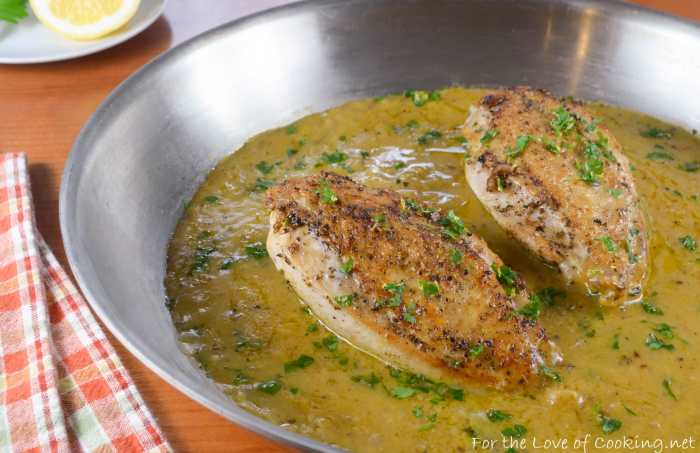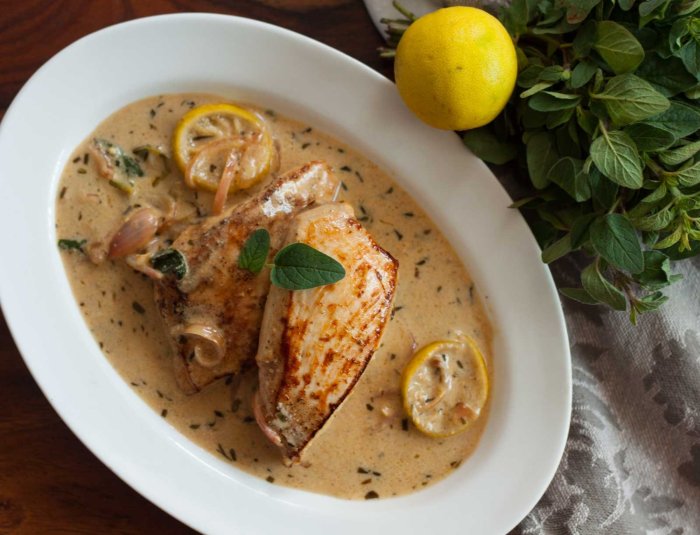Recipe Lemon Chicken Sauce A Culinary Exploration
Understanding Lemon Chicken Sauce

Source: modernhoney.com
Recipe lemon chicken sauce – Lemon chicken sauce, a culinary staple across various cuisines, boasts a bright, tangy flavor profile achieved through a simple yet elegant combination of ingredients. This versatile sauce finds its application in a multitude of dishes, ranging from simple chicken breasts to more elaborate gourmet creations. Understanding its fundamental components, variations, and culinary applications unlocks a world of flavor possibilities.
Typical Ingredients in Lemon Chicken Sauce
The foundation of a classic lemon chicken sauce typically includes chicken broth or stock, lemon juice (freshly squeezed is preferred), butter or oil, and seasonings. Common seasonings include salt, black pepper, garlic, and sometimes herbs like thyme or parsley. Some recipes might incorporate flour or cornstarch as a thickening agent, while others rely on a reduction technique to achieve the desired consistency.
The specific ingredients and their proportions can vary widely depending on the desired flavor profile and regional influences.
Regional Variations of Lemon Chicken Sauce
Lemon chicken sauce exhibits remarkable adaptability, reflecting regional culinary traditions. In Italian cuisine, you might find a lemon chicken sauce enriched with white wine and capers, lending a distinctly Mediterranean character. French versions often incorporate shallots and a touch of cream for a richer, more luxurious texture. Asian-inspired variations might incorporate soy sauce, ginger, and garlic for a savory-umami twist.
These variations showcase the versatility of the sauce, adapting to local flavors and ingredients.
Chemical Reactions During Cooking
The cooking process of lemon chicken sauce involves several key chemical reactions. The Maillard reaction, occurring between amino acids and reducing sugars at high temperatures, contributes to the browning and development of complex flavors. The interaction of lemon juice’s acidity with proteins in the chicken broth leads to denaturation and coagulation, impacting the sauce’s texture. Thickening agents like cornstarch create a gel through the formation of a starch network when heated in the presence of water.
A zesty lemon chicken sauce is a delightful complement to many dishes. For a contrasting flavor profile, consider incorporating elements from a richer sauce, such as the robust flavors found in a recipe for spaghetti sauce with italian sausage. The intense savoriness of the sausage sauce offers a fascinating counterpoint to the bright citrus notes of the lemon chicken, showcasing the versatility of diverse culinary approaches.
Ultimately, both sauces offer distinct yet equally satisfying experiences.
Understanding these reactions allows for greater control over the final product’s texture and taste.
Recipe Variations & Techniques
Three distinct lemon chicken sauce recipes are presented below, each offering a unique flavor profile and showcasing different techniques. These recipes highlight the adaptability of the base recipe, allowing for customization to suit individual preferences and culinary styles.
| Name | Ingredients | Instructions | Notes |
|---|---|---|---|
| Classic Lemon Chicken Sauce | Chicken broth, lemon juice, butter, flour, salt, pepper, garlic | Sauté garlic in butter, whisk in flour, gradually add broth, simmer until thickened, stir in lemon juice and seasonings. | Best served immediately. |
| Creamy Lemon Herb Sauce | Chicken broth, lemon juice, heavy cream, butter, thyme, parsley, salt, pepper | Simmer broth, add cream and butter, stir in herbs and seasonings, finish with lemon juice. | Pairs well with roasted chicken. |
| Spicy Lemon Garlic Sauce | Chicken broth, lemon juice, olive oil, garlic, red pepper flakes, oregano, salt, pepper | Sauté garlic and red pepper flakes in olive oil, add broth and oregano, simmer, stir in lemon juice and seasonings. | Adds a kick to grilled chicken. |
Fresh vs. Bottled Lemon Juice
While bottled lemon juice offers convenience, freshly squeezed lemon juice provides a superior flavor profile due to its higher concentration of volatile aromatic compounds. Freshly squeezed juice also offers a brighter, more vibrant acidity, enhancing the overall taste of the sauce. However, bottled lemon juice can be a suitable substitute when fresh lemons are unavailable.
Thickening Techniques
Several methods can thicken lemon chicken sauce. A cornstarch slurry (cornstarch mixed with cold water) creates a smooth, glossy consistency when added to the simmering sauce. A butter reduction involves simmering the sauce uncovered until the liquid reduces and the butter emulsifies, creating a richer, more concentrated flavor. Both techniques offer effective thickening, with the choice often depending on personal preference and desired texture.
Culinary Applications

Source: fortheloveofcooking.net
Lemon chicken sauce’s versatility extends beyond its traditional pairing with chicken. Its bright, tangy flavor profile complements a wide range of dishes, acting as a marinade, glaze, or dipping sauce.
Diverse Dishes Utilizing Lemon Chicken Sauce
- Lemon Chicken Piccata
- Lemon Chicken Pasta
- Roasted Chicken with Lemon Sauce
- Lemon Chicken and Vegetable Skewers
- Chicken Salad Sandwiches with Lemon Dressing
Versatility as Marinade, Glaze, or Dipping Sauce, Recipe lemon chicken sauce
As a marinade, lemon chicken sauce tenderizes the chicken while infusing it with flavor. As a glaze, it adds a glossy finish and enhances the chicken’s taste during roasting or grilling. Used as a dipping sauce, it provides a refreshing contrast to fried or grilled chicken.
Visually Appealing Presentation
A visually appealing presentation of a dish featuring lemon chicken sauce could involve pan-seared chicken breasts arranged on a bed of creamy polenta, drizzled generously with the sauce. Garnish with fresh parsley sprigs, lemon wedges, and a sprinkle of grated Parmesan cheese for a vibrant and appetizing presentation. The contrasting colors and textures create a visually appealing and delicious dish.
Flavor Profiles & Pairings: Recipe Lemon Chicken Sauce
Careful selection of herbs, spices, and side dishes can elevate the lemon chicken sauce’s flavor profile, creating a harmonious and satisfying culinary experience.
Complementary Herbs and Spices
Fresh herbs like thyme, rosemary, and oregano complement the bright citrus notes of the sauce. A pinch of red pepper flakes adds a touch of heat, while garlic and shallots enhance the savory depth. Experimentation with different herb and spice combinations allows for the creation of unique flavor profiles.
Suitable Side Dishes
- Roasted vegetables (broccoli, asparagus, carrots)
- Mashed potatoes
- Rice pilaf
- Pasta
- Couscous
Adjusting Sweetness, Acidity, and Saltiness
The balance of sweetness, acidity, and saltiness in the lemon chicken sauce can be adjusted to achieve different flavor profiles. Adding a touch of honey or sugar balances the acidity, while reducing the lemon juice decreases the tartness. Salt enhances the overall flavor and balances the other components. Careful adjustments allow for the creation of a perfectly balanced sauce.
Nutritional Aspects & Modifications
Understanding the nutritional content and making modifications to suit various dietary needs ensures a healthy and inclusive culinary experience.
Nutritional Content
The nutritional content of a typical lemon chicken sauce varies depending on the specific recipe and ingredients used. Generally, it is relatively low in fat and calories, but high in sodium due to the salt content. The nutritional information should be calculated based on the specific recipe used, taking into account the calories, fats, carbohydrates, and protein content of each ingredient.
Dietary Modifications

Source: archanaskitchen.com
For a gluten-free version, ensure that the thickening agent (if used) is gluten-free. For a low-sodium version, reduce or eliminate added salt and use low-sodium chicken broth. Vegetarian or vegan adaptations can be achieved by using vegetable broth instead of chicken broth and omitting any chicken-related ingredients.
Healthier Alternatives
Using reduced-fat chicken broth and substituting butter with olive oil reduces the fat content. Adding more vegetables to the sauce enhances its nutritional value and provides additional vitamins and minerals. Reducing the amount of added salt lowers sodium intake. These substitutions maintain the flavor while promoting a healthier option.
FAQ Section
Can I make this sauce ahead of time?
Yes, lemon chicken sauce can be made ahead of time and stored in the refrigerator for up to 3 days. Its flavor may even deepen slightly.
What can I substitute for cornstarch?
Arrowroot powder or flour can be used as substitutes for cornstarch, though you may need to adjust the amount slightly depending on the thickening power of the substitute.
How do I prevent the sauce from becoming bitter?
Avoid overcooking the sauce, and use fresh, high-quality lemons. Taste and adjust the acidity with a touch of sugar if needed.
Can I freeze lemon chicken sauce?
Yes, you can freeze lemon chicken sauce in airtight containers for up to 3 months. Allow it to thaw completely before reheating.




















